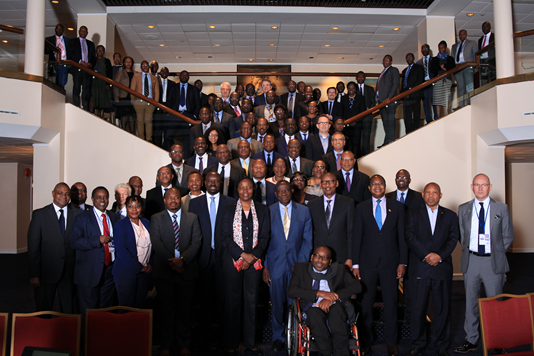- November 1, 2019
- Posted by: admin
- Category: Current News
Sound governance practices have enormous benefits which the MEFMI region should embrace. Economic institutions in the region should therefore take the necessary steps to better their governance practices to realize their economic development potential. This was said by the Zimbabwe’s Minister of Finance and Economic Development, Honourable Mthuli Ncube during the official opening of the MEFMI Combined Forum in Washington DC, United States of America.
 The Minister noted how the lack of enforcement of basic tenets of good governance undermines the rule of law, contract enforcement and erodes investor confidence. He further said that when these are entrenched, they serve to undermine the achievement of a country’s desired level of economic development. Honorable Ncube highlighted the challenges of putting in place proper governance structures, ranging from political capital, technical to financial constraints. The Minister pointed out the political and economic heterogenoeity of countries calls for strategic approaches at country level; citing the case of Zimbabwe that recently assessed and identified governance vulnerabilities. He said that these are expected to shape the agenda for better governance and anti-corruption in Zimbabwe.
The Minister noted how the lack of enforcement of basic tenets of good governance undermines the rule of law, contract enforcement and erodes investor confidence. He further said that when these are entrenched, they serve to undermine the achievement of a country’s desired level of economic development. Honorable Ncube highlighted the challenges of putting in place proper governance structures, ranging from political capital, technical to financial constraints. The Minister pointed out the political and economic heterogenoeity of countries calls for strategic approaches at country level; citing the case of Zimbabwe that recently assessed and identified governance vulnerabilities. He said that these are expected to shape the agenda for better governance and anti-corruption in Zimbabwe.
In his presentation at the Forum, Mr. Paolo Mauro, Deputy Director in the Fiscal Affairs Department at the International Monetary Fund, highlighted the Fund’s efforts to strengthen the governance framework it uses to engage its membership. He summarised the main findings of the macroeconomic implications of weak governance, corruption and also showed how corruption undermines government revenue collection and value for money. He highlighted how strengthened fiscal institutions and other restraints to government excesses combine to produce better fiscal outcomes.
Mr. Mauro further called for international cooperation to address the supply side of corruption as well as the role of the Fund in capacitating countries’ economic governance institutions. In the ensuing discussion, corruption links to the political economy were highlighted where Mr. Mauro argued that corruption starts with heads of institutions taking bribes and when this gets institutionalised, the fight against corruption stands to lose. Delegates in the Forum observed that the use of corruption perceptions in the analysis was not very accurate and Mr. Mauro informed participants that the IMF is collecting additional information to complement its analytical work on corruption. He encouraged the MEFMI member countries to volunteer for assessment of their governance vulnerabilities as Zimbabwe had done.
Sound corporate governance was lauded by Mr. Mohammed Nyaoga, the Chairman of the Central Bank of Kenya, as the foundation for safeguarding financial stability. His presentation pointed out that governance encompasses processes, structures and information that is used to direct and provide oversight of an organisation. He highlighted the unique characteristics and special role the financial sector plays in sustainable economic development, which calls for strong corporate governance. In light of the ever changing business models driven by the fast evolving financial technological innovation in the sector, Boards of Directors have to continually ensure appropriate governance structure are in place to address the associated challenges.
Mr Nyaoga’s presentation highlighted the evolution of financial sector governance in Kenya, pointing out the separation of powers and roles between the Board Chair and Governor of the Central Bank to ensure proper checks and balances. He also pointed out some perspectives on autonomy, transparency and accountability, and conflict management that support the separation of these roles and powers, and enhance central bank independence. Mr Nyaoga further outlined the three key pillars of the Bank’s board structure, which are a strong legal framework enshrined in the country’s constitution; strong institutional arrangements to support collaboration with the national treasury, and the benchmarking of its operations to international best practices.
The presentation identified some threats and challenges to governance frameworks particularly for central banks which include political interference, resource constraints and anti-money laundering. MEFMI was urged to work with policy makers and regulators in the region to institute interventions that promote better governance practices in the financial sector for better economic outcomes.
The discussion of the presentation mainly centered on the separation of the powers and roles of the Board Chair and Governor where Kenya is the only African country with such a structure. The responses clarified a number of issues in the presentation with a call for central banks to identify and adapt good governance practices.
